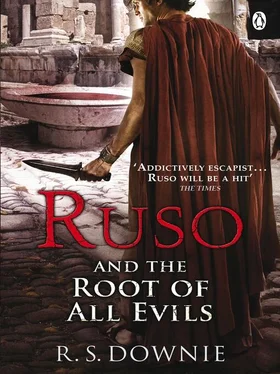Ruth Downie - Ruso and the Root of All Evils
Здесь есть возможность читать онлайн «Ruth Downie - Ruso and the Root of All Evils» весь текст электронной книги совершенно бесплатно (целиком полную версию без сокращений). В некоторых случаях можно слушать аудио, скачать через торрент в формате fb2 и присутствует краткое содержание. Жанр: Исторический детектив, на английском языке. Описание произведения, (предисловие) а так же отзывы посетителей доступны на портале библиотеки ЛибКат.
- Название:Ruso and the Root of All Evils
- Автор:
- Жанр:
- Год:неизвестен
- ISBN:нет данных
- Рейтинг книги:5 / 5. Голосов: 1
-
Избранное:Добавить в избранное
- Отзывы:
-
Ваша оценка:
- 100
- 1
- 2
- 3
- 4
- 5
Ruso and the Root of All Evils: краткое содержание, описание и аннотация
Предлагаем к чтению аннотацию, описание, краткое содержание или предисловие (зависит от того, что написал сам автор книги «Ruso and the Root of All Evils»). Если вы не нашли необходимую информацию о книге — напишите в комментариях, мы постараемся отыскать её.
Ruso and the Root of All Evils — читать онлайн бесплатно полную книгу (весь текст) целиком
Ниже представлен текст книги, разбитый по страницам. Система сохранения места последней прочитанной страницы, позволяет с удобством читать онлайн бесплатно книгу «Ruso and the Root of All Evils», без необходимости каждый раз заново искать на чём Вы остановились. Поставьте закладку, и сможете в любой момент перейти на страницу, на которой закончили чтение.
Интервал:
Закладка:
The grief and fear on the faces of the estate staff was all too real. Ruso counted at least thirty of them, and there would be others back at the house busily cleansing and purifying.
As the burning wood crackled and the column of smoke rose into the clear sky the smell of incense failed to disguise the stench of burning flesh.
Ruso glanced around the mourners. Everyone he knew who might possibly have a motive for poisoning Severus was here. If he were the Senator’s investigator, which one would he decide to accuse?
The answer was obvious. The only certain way to save himself would be to reveal that Claudia had bought the honey. And if he did that, Probus would bring the fragile edifice of the family debts crashing down around him. He would survive as the powerless guardian of a family with nowhere to live. Tilla would have to choose whether to stay here and share his disgrace, or travel home alone.
42
This god did not have much of a house. Fifteen or twenty of his followers were crowded into a stone outbuilding that seemed to have been hastily cleared for the purpose. There was no statue. No shrine. No sacrifice this evening, either. Tilla was relieved about that. Galla did not seem the sort to be involved in murdering babies and drinking their blood, but she had heard that this dreadful practice was the reason the followers of Christos were only marginally more popular with Rome than the Druids. Mind you, much of what the Romans said about the Druids was lies too.
When she asked about the sacrifice, Galla assured her that it had already been done. There was no sign of it. Tilla glanced out through the crack between the door-frame and the wall. All she could see in the narrow streak of vision was a massive kiln and a stack of wood ready to fuel it.
There was no blood — just a motley selection of food and drink that the worshippers had brought and laid on the cloth in the middle of the floor. Galla had brought the bread she had saved from her lunch. Tilla, who had misunderstood her invitation to meet her brothers and sisters, was embarrassed to find that she had come to face a new god empty-handed. But what could she have brought? The fleece stuffed under her bed was inedible and she could not imagine a god — or anyone else — wanting the grape-and-feet juice she had helped to produce yesterday. Casting her eye over scattered loaves of bread, grapes, olives, two cheeses, small cakes and a platter of cold chicken, she considered the offering she had made to the goddess in Nemausus. Hair would definitely be wrong here.
‘Those who have, bring to share,’ explained Galla, evidently sensing her discomfort. One child had brought a striped cat, but since the sacrifice had already been carried out, it was presumably safe curled up on her lap. Two old women arrived without gifts and sat huddled under their shawls by the edge of the cloth. Moments later one of them appeared to be chewing. Either she was sucking her teeth from habit or she had sneaked something from the cloth before everyone else started.
The man who seemed to be the leader welcomed everyone to the supper, ‘especially brother Solemnis, who has brought greetings from our friends by the river at Arelate …’ Brother Solemnis was a bony youth with buck teeth. ‘And it’s a joy to welcome two new sisters.’ He glanced at one of the old women. ‘Agatha from the town, and …’
Tilla said, ‘Darlughdacha,’ at the same moment as Galla said, ‘Tilla.’
‘But you can call me Tilla,’ she conceded. The god would not know her by her British name anyway.
‘You’ve come a long way.’
‘From Britannia.’
‘It’s a delight to have you here, Sister.’
She found herself returning his smile, surprised and a little suspicious that these people were so glad to see her. This was the warmest welcome she had received anywhere since they had left home.
‘You must take our greetings back to the believers in Britannia,’ continued the man.
‘I do not think there are any,’ she said.
‘Then the Lord has a job for you!’ The man seemed happy to hear this. ‘You will have the honour of telling them the good news!’
Everyone looked so pleased at this prospect that Tilla decided not to explain how few Britons would be interested in announcements from the far end of Gaul, good or otherwise.
Someone started singing. Others joined in. Knowing neither tune nor words, Tilla was obliged to listen. It became clear that this god welcomed both those who could sing in tune and those who only thought they could. Things would have been much improved by a few pipes and some dancing, but the food was taking up the only space left on the floor, and for some reason nobody suggested going outside. Indeed, even the singing was surprisingly restrained, although some of the participants closed their eyes and began to sway as if deeply moved. When it was over Galla leaned across and whispered, ‘It is safe here, but it is best not to draw attention.’
By the time the leader had thanked Christos at length for the food and everyone had opened their eyes again, several little cakes had vanished from the platter and both old ladies were sucking their teeth.
Privately Tilla thought that the leader would have been wiser not to speak to Christos about eating his flesh and drinking his blood. It was the sort of thing that got people into trouble. She suspected this group had been badly advised. They did not have a proper priest: the man in charge was dressed as an ordinary worker. It was the same at home. Her mother had always said that since the Druids went into hiding, odd ideas had been allowed to flourish like weeds.
‘We will eat and drink together until the Lord comes,’ announced the leader.
‘He is coming tonight?’ whispered Tilla, wondering whether this was an illicit party and the lord who owned the building would expect to find his workers at their duties.
‘We never know,’ said Galla.
No one seemed very worried. Perhaps they had set up some sort of a lookout. For some reason Tilla was reminded of a long-dead aunt who had set out a bowl every evening for her absent husband even though everybody knew he had set up home with another woman down in Eburacum.
During the meal the leader and another man took turns to entertain the diners with Greek read from a battered scroll, while a woman translated into Latin. The story was not a patch on the stories they had at home. It was not a story at all. It seemed to be just some sort of letter urging people somewhere else to cheer up because their god was looking after them even if they ran out of food or clothes or if people attacked them. For a moment she wondered what was the point of worshipping a god who refused to defend his followers, then it occurred to her that this was uncomfortably close to the situation at home.
When most of the food was gone and one of the old women had hidden half a loaf of bread under her shawl, it was time to pray to the god again. Tilla glanced around at the faces: the two old women, five or six sun-browned men with the hard hands and patched tunics of farm slaves, the girl stroking the striped cat, the leader and his wife, three women who were not wealthy, a couple of child slaves, and the bony youth from Arelate. All had their eyes closed. She supposed they were busy trying to picture the god they could not see but who, according to Galla on the way over here, was everywhere and loved everybody. Tilla let her own eyes drift shut and tried to imagine this god, but without success. How would you recognize him? Without a statue to show what he looked like, or even a tree or a rock to mark his special home, how could anyone tell whether he was somewhere — or nowhere?
Since it seemed anyone could pray and everyone wanted to, the prayers went on a long time. Some of them were in Gaulish or Greek. One of the ones she understood was a request to the god to protect and guide the Emperor.
Читать дальшеИнтервал:
Закладка:
Похожие книги на «Ruso and the Root of All Evils»
Представляем Вашему вниманию похожие книги на «Ruso and the Root of All Evils» списком для выбора. Мы отобрали схожую по названию и смыслу литературу в надежде предоставить читателям больше вариантов отыскать новые, интересные, ещё непрочитанные произведения.
Обсуждение, отзывы о книге «Ruso and the Root of All Evils» и просто собственные мнения читателей. Оставьте ваши комментарии, напишите, что Вы думаете о произведении, его смысле или главных героях. Укажите что конкретно понравилось, а что нет, и почему Вы так считаете.












